 KUWAIT: Iraqi Foreign Minister Ibrahim Al-Jaafari (left) and his Kuwaiti counterpart Sheikh Sabah Al-Khaled Al-Sabah attend the fifth session of the Iraqi-Kuwaiti Joint Supreme Ministerial Committee yesterday. — Photo by Yasser Al-Zayyat
KUWAIT: Iraqi Foreign Minister Ibrahim Al-Jaafari (left) and his Kuwaiti counterpart Sheikh Sabah Al-Khaled Al-Sabah attend the fifth session of the Iraqi-Kuwaiti Joint Supreme Ministerial Committee yesterday. — Photo by Yasser Al-ZayyatKUWAIT: Kuwait and Iraq have wiped out obstacles and outstanding files that existed over the past years, First Deputy Prime Minister and Foreign Minister Sheikh Sabah Al-Khaled Al-Hamad Al-Sabah said yesterday at a press conference with visiting Iraqi Foreign Minister Ibrahim Al-Jaafari after the conclusion of the fifth session of the Kuwaiti-Iraqi Joint Ministerial Committee.
Over the past years, Kuwaiti-Iraqi relations have overcome all obstacles, and the two countries addressed issues that were outstanding over decades, Sheikh Sabah said, noting that they stand on solid ground for boosting ties. He said both sides agreed on rejecting all forms of terrorism and the need to unite in facing terrorism and terrorist groups and organizations, especially since both countries had suffered from terrorism.
The Kuwaiti FM added that the joint committee discussed various issues that would cement bilateral relations as well as achievements made last year, such as opening two new Kuwaiti consulates in Basra and Irbil, cementing commercial relations and facilitating transport. In 2014, more than 142,000 Iraqis entered Kuwait, while 50,000 Kuwaiti crossed into the opposite direction, the minister added. "We signed four agreements today on inspection, control, youth and sports and activating intercommunications through fiber optic cables," he explained.
Responding to a question about commercial exchanges and the possibility that Iraq supplies Kuwait with gas, Sheikh Sabah Al-Khaled said that an agreement had already been signed in this regard and that officials would soon meet to put final touches to the agreement. He also noted that commercial exchanges had grown by 22 percent since last year
Jaafari stressed that Iraqi-Kuwaiti relations would always be strong and that this had already been proved. He seconded Sheikh Sabah's views on terrorism, noting that Iraq was currently fighting terrorism on behalf of the entire world as Islamic State members flocking to Iraq have come from over 100 countries. "Today, terrorists are being defeated and routed out of many cities and places thanks to Iraqi military forces strikes and operations," he said, denying the presence of foreign troops fighting IS on the ground in Iraq. "We only coordinate with coalition forces to provide air coverage, some advisors and trainers," he said, noting that Iraq does not want any foreigners fighting on behalf of Iraqis.
Responding to a question about taking part in the Islamic military coalition formed by Saudi Arabia, Jaafari said Iraq only came to know about the coalition from TV reports and should have been properly contacted. He noted that Iraq was at war against terrorism and not with Sunnis or Shiites, who he claimed coexist peacefully in Iraq.
Jaafari also denied yesterday any link between his government and the kidnappers of 26 Qatari hunters, allegedly people linked to Shiite militiamen on whom Baghdad relies heavily against the Islamic State group. During a press conference, a reporter asked Jaafari to comment on "accusations that the kidnappers are members of Hashad al-Shaabi (Shiite paramilitary force), which is linked to the Iraqi government". "I categorically deny that the Iraqi government has any link to the (kidnapping) case," Jaafari said. "I hope some would not become suspicious that the government colluded" with the kidnappers.
Wealthy citizens of Sunni Gulf states venture to countries including Pakistan, Afghanistan and Iraq to hunt with falcons without the bag limits and conservation measures they face at home. The Qataris, which include members of the small country's royal family, were kidnapped in southern Iraq last week. There is significant hostility in Iraq, especially in the Shiite-majority south, over the Gulf countries' policies on the Syrian civil war and perceived complicity in the rise of IS.
Jaafari acknowledged that security problems in his war-torn country could have led to the kidnapping. He also insisted that the Iraqi government has been working to resolve the issue and secure the release of the Qataris. His remarks came after the Gulf Cooperation Council condemned yesterday the kidnapping as a "breach of international law" and warned it could "hurt relations between Arab brothers".
A statement called on Baghdad to shoulder "its international legal commitments and to take immediate and decisive measures to ensure the safety of those abducted and secure their release". The hunters entered Iraq with an "official permit" from the interior ministry, Qatari has said. Kuwaiti media reported at the weekend that at least seven of the Qataris had managed to flee from their captors and travel home through Kuwait. There has been no official Qatari confirmation.
Sheikh Sabah Al-Khaled said Jaafari and himself met HH the Deputy Amir and Crown Prince Sheikh Nawaf Al-Ahmad Al-Jaber Al-Sabah and listened to his wise views on bolstering bilateral ties, pushing them to higher prospects. He reiterated Sheikh Nawaf's blessings to efforts that seek to promote cooperation for realizing expectations of people in the two countries. He also referred to a similar meeting with HH the Prime Minister Sheikh Jaber Al-Mubarak Al-Sabah, who was briefed on the details of the fifth session of the joint higher committee.
By Meshaal Al-Enezi and Agencies










